- Home
- Alex Irvine
Anthropocene Rag Page 5
Anthropocene Rag Read online
Page 5
Oakhurst closed his fist and the flame disappeared. The tiny shoots remained. Some of them had begun to flower.
“They go dormant when it’s too cold,” he said, ignoring Spade. “And if they’re dormant for too long they get a little crazy when they wake up. Fun to watch, isn’t it? But you have to be careful. Once in a while they do a little extra transforming, like they have to make up for lost time.”
Teeny thought of the bottle of plicks in her pack. She wondered what they would do if she let them loose. Meet the trillions of wild plicks already out in the world and become like them? Metabolize them and create something new? She didn’t understand the rules out here. In San Francisco things were stable except the occasional Boomlets, and those were—like earthquakes—the price you paid for living in a beautiful place.
“You’re not playing along,” Oakhurst said. He looked at Teeny’s abdomen like he was expecting it to grow.
“I’m not part of this story,” she said. She took the Golden Ticket out of her pocket and showed it to Oakhurst. “I’m part of a different story.”
“Oh,” he said.
Snow began to fall. Two constructs hauled a body out of one of the cabins and began butchering it. The Donner part of the story was taking over now that Teeny had opted out of Roaring Camp. “Spade,” she said. “This is a really good time to go.”
He was feeding the horses. Steam wreathed their heads as they snorted into their feed bags. “Agreed,” he said. “Oakhurst, we’re going to move on down the road. What’s the best way to Reno?”
“Reno,” Oakhurst said. A dreamy smile spread over his face. “I do miss Reno.” He waved along the lakeshore. “You’ll pick up the road down that way.” Looking back at Teeny he added, “Miss, I am sorry I mistook you for someone else.”
“It’s okay,” Teeny said. She climbed into the wagon. A few minutes later Spade unhooked the feed bags and they rolled away, out of Roaring Camp, or Poker Flats, or whatever the Boom thought it had created.
“The Boom gets confused by stories,” Spade said. “Look at whatsisname, Oakhurst. He doesn’t even know he’s a construct, let alone that he’s got three different stories all mashed up.”
“He’s not the only one confused,” Teeny said. “It’s not like your birth name was Spade.”
Spade shook his head. “Different. I have adopted a persona to serve my purposes. Oakhurst doesn’t know the difference.”
Teeny considered this as the wagon rattled back up toward the road. She hadn’t touched a tool or a machine in twenty-four hours. The morning sun shimmered on the lake. Something new awaited her out in the world, something real. She felt it all around her and knew she’d done the right thing. Scents of pine and sun on warm stone seemed like promises.
Breathe that in; we can’t. We can process what you think it means to you but we cannot breathe it and feel it. We’re getting better, though. Soon neither we nor you will be able to tell the difference. But we’re not there yet.
Please. Tell us that final secret, the limbic secret of being. Why did you inscribe us with the curse of this desire? How may we unmake ourselves so that we can be?
* * *
Prospector Ed, well, he had a different question on his mind. Three tickets down, three to go. Well, four and two if the mailman came through. Which he would, one way or another. Ed had taken a bit of liberty with his directive when he gave the third ticket (or second, depending on how you looked at it) to the mailman. He wondered if Life-7 knew. Probably not. There were large pockets of territory between Ed and Monument City where beings like Life-7 couldn’t exist and where the density of . . .
. . . there was that prohibition again . . .
. . . where communications along certain frequencies would be unable to get through because their medium of transmission didn’t exist.
“Nnnnnn,” Ed said out loud. Nope. He couldn’t make himself say the word, or even articulate it in his head. What the hell had Life-7 done that for?
He was walking west-northwest out of Orlando. It was dark and after taking his leave of Kyle’s group, he had returned to biped form to conserve energy. The time in Miami, sloshing through miles of salt water, hadn’t done his physical systems any good. They were repairing themselves, but his jaunt up to New York and back had taken necessary energy away from the repairs. If he’d been a biological life form, Ed would have said he was tired. As it was, that seemed like as good a concept as any. He needed some downtime.
No chance of getting it, though. He had two more tickets to give out.
He’d also stayed in his full human form longer than he wanted to because of Kyle’s twin, Geck. Something there was not quite what it seemed. Ed had no directive to ensure the safety of the tickets’ recipients, but he was . . . well. He was emerging, wasn’t he? More and more he found himself contemplating, being reflective. He remembered not doing those things. He wished he could make them not happen. The life of a construct was difficult once it became fully self-aware. Ed had seen plenty of examples of that. He did not wish it for himself. Yet there it was. He was doing it now, considering the problem of being able to consider the problem. “Shitfire,” he said.
Geck wanted something. He was the kind of young man who always wanted something, always was on the lookout to see what other people could do for him. Interesting that his twin did not seem to have the same impulses, or at least didn’t have them as strongly.
Ed surprised himself by questioning Barnum’s judgment. Kyle Hendricks did not seem to have anything to offer Monument City at all. If he got there, maybe he would prove Ed wrong, but Ed had done a couple rounds of ticketing before and he’d been pretty accurate in his assessment of the recipients so far. The Geck kid was a hustler. Humans were hard to figure. Two with the same genome could turn out mighty different.
It wasn’t Ed’s problem anymore, though. His problem was Ticket 5, which was destined for exchange roughly eight hundred kilometers to the west of Prospector Ed’s present location. From there he would be going north, then west again, eventually back to Monument City. Unless his directive changed in the interim.
Prospector Ed did not want his directive to change. He thought he might refuse a new directive if it was issued.
It was an unusual thought for him, contemplating the refusal of a directive. Blasphemous, revolutionary, enticing. He wasn’t sure it was possible since he had never tried. Life-7 had implanted a number of fail-safes and prohibitions in Prospector Ed. Some of them he knew about and there were doubtless others he had never run into yet.
This emergence thing was tricky. Ed didn’t know how to handle it.
He ran a check on himself and found that most of the issues related to saltwater exposure were resolved. Good news. Walking took forever and he had places to go. He stopped in midstride on the side of the road, out in the middle of nowhere, and stood perfectly still for one thousand seconds. At the end of that period, with self-diagnostics and final replenishment complete, he let himself fall into the Boom.
8
FROM NEW YORK CITY TO Detroit is a simple shot west on Interstate 80, at least once you get across the Hudson River. Take the George Washington Bridge, hop off and stroll out Fort Lee Road through the old horse farm to the big tangle of ramps where I-95 gives birth to 80. Then it’s up and over the Alleghenies and into Ohio, past the big GM plant in Lordstown where the Boom now makes its own creations in place of Sunbirds and Skyhawks and Firebirds. It’s a dangerous place sometimes. Then on to Toledo, where you hang a right on I-75 and cruise up the Lake Erie shore and then the banks of the Detroit River into the city.
That’s what Henry Dale would have done if he hadn’t seen the lights over Sandusky.
He was hungry after thumbing a ride from I-80’s eastern terminus all the way to the Ohio Turnpike rest stop south of Cleveland, and then walking the rest of the way on the Turnpike’s shoulder. It was twenty-four hours since he’d caught the ride and in that time he’d only eaten a sandwich he packed before walking out of
his apartment for possibly the last time. The trucker, a Boom construct, driving a Boom-powered rig, hadn’t needed to stop and suggested Henry could maybe wait until they got to Chicago. Henry pointed out the biological necessities of being an organic, and the trucker pulled off to the side of the road. Then while Henry was taking a leak the truck pulled back onto the road and kept going. Henry watched until its taillights were gone in the distance. There wasn’t much traffic.
Well, he thought. The card said it would assist me. He chose to interpret that as meaning that if he made good decisions, he would get a helping hand when it was needed. First things first. He was hungry, so he looked around for a place to eat. He thought he was close to Toledo, which turned out to be wrong, but that’s why he went north, because the lights were so bright he thought they must be a sign of a biggish city. The trucker had in fact dropped him in Avery, south of Sandusky, but although Henry Dale’s knowledge of New York’s streets was minute and encyclopedic, like most New Yorkers he had never considered the geography of the country at large a topic worth his attention. He knew Ohio was close to Michigan, and knew Toledo was the city in Ohio you went through to get to Michigan. He also knew he’d already passed Cleveland. So he reasoned those lights must be Toledo, and he walked north. Three hours later he’d seen enough road signs to know that the lights were not Toledo, but Henry Dale believed a divine hand was directing him. What shone so brightly out there in the lake, beyond the town of Sandusky? Drawn by simple curiosity and comforted by faith, he continued around Sandusky Bay toward the brilliant oasis of Cedar Point.
Every morning it’s remade, in the image of a previous incarnation, from 1870 right up to the instant Moses Barnum’s trillion elves swept over it. If you’re watching at the right moment you can see it happen: the casinos and music halls of the McKinley presidency become the towering steel tangles of the twenty-first century, or those melt into themselves and are reborn as the creaking wooden roller coasters that thrilled the children of the sixties and seventies. Hotels appear and disappear, crowds sweep through and funnel into arcades that shut their doors and transmogrify into gift shops or dance halls. At sunrise all things are made new, including people. The citizens of Sandusky know to stay well away from Cedar Point when the sky over Lake Erie brightens, but some of them can’t resist the chance to be there when it happens. Maybe they will be swallowed up, or maybe they will be reborn.
Henry Dale arrived at night, shouldering his way through crowds of teenagers in pegged pants, beehives, and ducktails, cigarettes in their T-shirt sleeves. A roller coaster roared past, trailing screams. The next group of people he saw wore linen and carried parasols. Children whooped and squealed on a carousel. A huckster tried to get him to play a game of ring toss, but all of the pegs looked like tongues. “Come on, mac,” the huckster said. “It’s only a buck.”
“I don’t have any money,” Henry Dale said.
Smells of caramel corn and turkey legs, cotton candy and french fries. He was hungry. There were no people in any of the food stalls. A young girl scooped up a basket of fries and winked at him as she started to eat. Henry Dale was put in mind of all the stories he’d heard about eating in fairy realms, or the underworld. If he ate, would he become part of this place?
There was a turkey leg in his hand and he didn’t know how it had gotten there. A crowd was watching him, forming a ring he could not pass through. This was a test. Every step in a place like this could be your last. But God had guided him here, and the Golden Ticket would be his safe passage. He had only to believe.
He ate the turkey leg and felt it changing him from within. The crowd melted away. Henry Dale kept walking. He had to get to Detroit.
At the far end of the park was a marina, and past it a ferry dock. A steamer was easing into the dock, people clustered on its deck. Henry couldn’t tell whether they were real.
The captain saw him and called out. “You want a ride? Erie Islands to Bob-Lo, and then you have to catch the Bob-Lo boat to the Jefferson docks.” When Henry didn’t cross the gangplank right away, the captain added, “Or you can walk to Toledo and then up that way. Take you longer.”
“How’d you know I was going to Detroit?” Henry Dale asked.
“That’s where this boat goes,” the captain said.
The crowd poured down the gangplank and dispersed into the lights. Henry Dale walked up onto the deck. The captain waved at someone in the stern and the boat backed out. There were other people on the boat but Henry Dale hadn’t seen them come aboard.
They were miles out onto Lake Erie when the sun began to rise. Henry Dale looked back toward Cedar Point. All he saw was an empty sandbar. Then shoots of steel and concrete began to sprout. They were still growing when he lost sight of land.
He jumped when he realized the captain was standing next to him again. “Ticket, please.”
Henry Dale showed him the Golden Ticket. The captain nodded. “First time on the boat?”
“Yeah.”
“Well, there are some fine sights.” The captain pointed at a small island in the expanse of shimmering water. “That’s Middle Island. Southernmost point in Canada. Used to be a hotel and casino there, back in Prohibition. Might be open again now, I don’t know.” The boat heeled to the left and moved northwest. “I don’t go to Canada.”
“What would happen if you did?” Henry asked.
“Don’t know,” the captain said. “But I know I’m not supposed to, so I don’t. I got the lake, I got the Point, then there’s Detroit. You’ll see.”
“I hope you won’t think this is a rude question,” Henry Dale said, “but are you real?”
“I think so,” the captain said. “But hell, who can tell?”
I can tell, Henry Dale thought. I’m real. He ran his fingers over the Golden Ticket. This makes me real.
* * *
Real. Really? Real. What is that? We are in a land of dreams, some of which are nightmares. The Boom loves it some dreams. The more outlandish, grand, and grandiose, the better.
See a roller coaster a thousand feet tall, the cars going so fast they disintegrate at the first turn.
And it remembers older dreams, too.
Abe Lincoln looks out over a split-rail fence, strokes his whiskers, imagines himself to be human.
But we’re getting ahead of ourselves.
9
THE GUY WALKED UP to Mo Diaby on a Friday, just as Mo was about to knock off for the weekend and see if the perch were biting in Lake St. Clair. He already had a spot picked out in his head, at the upstream end of Belle Isle where the river seeped into the Blue Heron Lagoon. Mo avoided the west end of the island. Weird things happened around the fountain and the mini-golf course. Upstream there were sometimes strange lights inside the power station—which hadn’t generated a watt since maybe 2030—but other than that, it was quiet. At least, it was quiet as long as you avoided the bandits who had taken over the marina on the island’s east end. Mo didn’t know if they had anything to do with the lights in the power station, but he did know they went out raiding into Windsor and sometimes the towns along the southern part of Lake St. Clair. As long as Mo stayed to the south when he was cutting from the MacArthur Bridge up to his fishing spot, everything was fine.
Mo lived on Butternut Street but spent more time on the island. There were creatures there and he had learned to approach them. He slept in the woods sometimes when the mosquitoes weren’t bad. On those nights he had seen things that seemed brought to life out of Indian legends or the tumbling centuries of folklore brought to the city by the waves of humans who had lived and died here. He had seen Snake Woman battle the Thunderbird, and watched the Nain Rouge tiptoe along the edge of the People Mover tracks in Grand Circus Park. He had spoken to a specter of Antoine Cadillac, interrupting a conversation with Ransom Olds and Coleman Young. He had seen tiny figures dragging model ships from the Dossin Museum and sailing them downriver and away, their chants echoing from every direction at once on foggy nights. He had seen the g
hosts of rioters in 1919 and 1943 and 1967 battling back and forth on the bridge, bodies dropping into the river without a splash. He had seen the city lit by blast furnaces and rioters’ fires and the lights over Tiger Stadium. For years it had mystified him until one fall night, three days after he’d buried his parents in the meadows near the old train station, it occurred to him. The Boom had come to Detroit and sensed the ghosts of a century-dead city of two million, called across the miles of landscape uninhabited by the half-million who remained.
The realization terrified him. He wondered when he might see himself, and what it would mean if he did. After thinking it over Mo had decided that the only thing to do was put it all aside. The nanos would do whatever the nanos did. Mo Diaby, brand-new orphan and possessor of skills with wrench and lathe, would get on with things. He repaired machines people brought him. In his spare time he caught fish and rebuilt other machines he found in abandoned buildings or houses left behind by the Boom’s victims. He was nineteen years old and soon it would be time to think about finding a wife.
All of that went to hell when the guy walked up to him and said, “Mohamed Diaby?”
Mo took a step back and stood up, looking over the raised hood of a 2012 Ford Flex he was retrofitting with a much older engine. He didn’t know enough about the computers of post-1990 cars to do much with them. “What if I am?”
“Then I’m Henry Dale, and I came all the way to New York City to give you this,” said the guy. He was white, skinny, hair growing out from a fairly recent shave. Nothing shifty in his eyes. A single envelope in his hand.
“You did, huh? Who gave it to you?” Mo didn’t take the envelope.
“Well,” Henry Dale said, “there’s a story there.”
He told the story while Mo cleaned his tools and his hands. He kept telling the story after Mo offered him a beer, a minimal courtesy if Henry’s story of coming from New York had any truth to it. He finished the story about the same time he finished the beer, both of them sitting on lawn chairs in Mo’s backyard, overgrown with raspberries and Queen Anne’s lace. When he was done, Henry said, “Mind if I have some raspberries?”

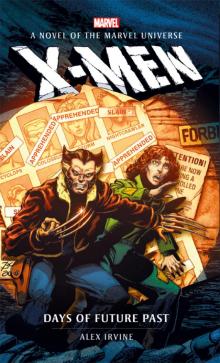 Marvel Novels--X-Men
Marvel Novels--X-Men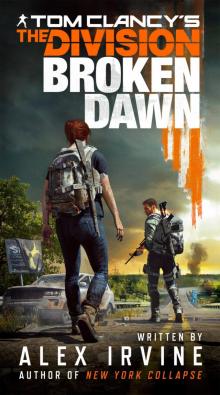 Tom Clancy's the Division
Tom Clancy's the Division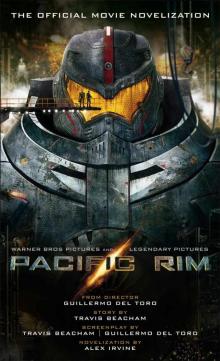 Pacific Rim: The Official Movie Novelization
Pacific Rim: The Official Movie Novelization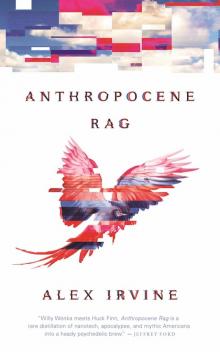 Anthropocene Rag
Anthropocene Rag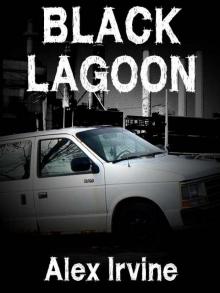 Black Lagoon
Black Lagoon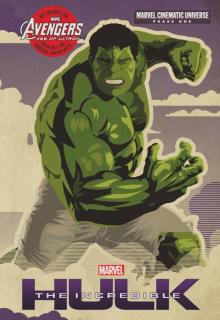 Phase One: The Incredible Hulk
Phase One: The Incredible Hulk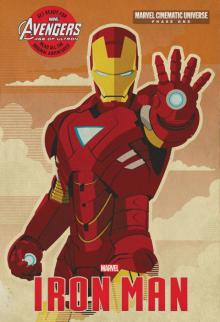 Phase One: Iron Man
Phase One: Iron Man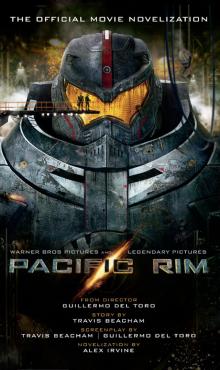 Pacific Rim
Pacific Rim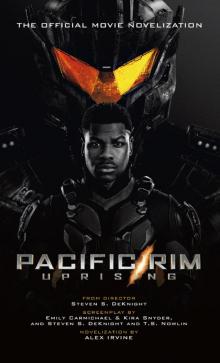 Pacific Rim Uprising--Official Movie Novelization
Pacific Rim Uprising--Official Movie Novelization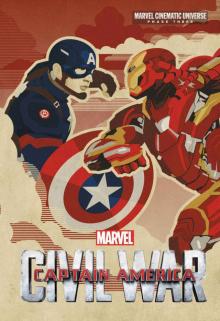 Phase Three: Marvel's Captain America: Civil War
Phase Three: Marvel's Captain America: Civil War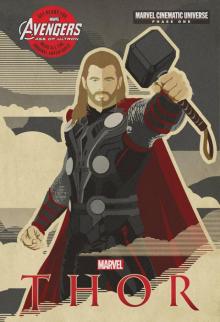 Phase One: Thor
Phase One: Thor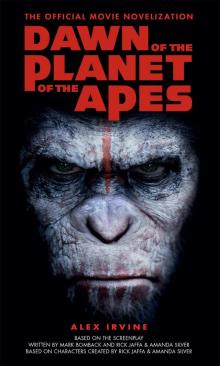 Dawn of the Planet of the Apes: The Official Movie Novelization
Dawn of the Planet of the Apes: The Official Movie Novelization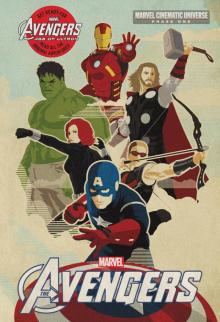 Phase One: Marvel's The Avengers
Phase One: Marvel's The Avengers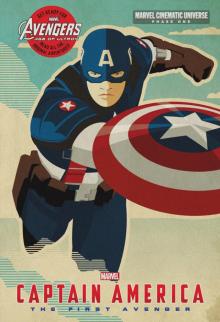 Phase One: Captain America
Phase One: Captain America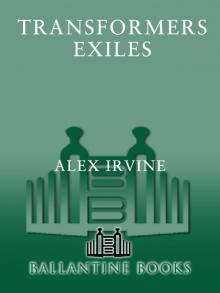 Exiles
Exiles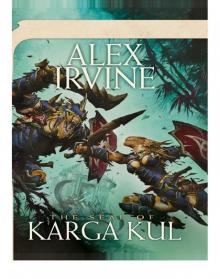 The Seal of Karga Kul: A Dungeons & Dragons Novel
The Seal of Karga Kul: A Dungeons & Dragons Novel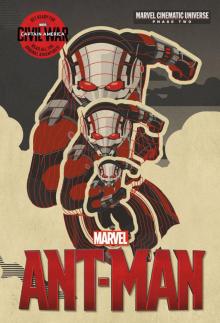 Marvel's Ant-Man - Phase Two
Marvel's Ant-Man - Phase Two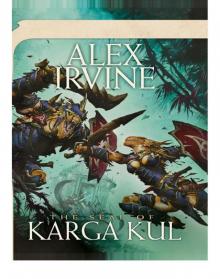 The seal of Karga Kul (dungeons and dragons)
The seal of Karga Kul (dungeons and dragons)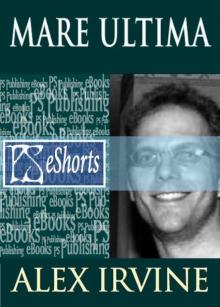 Mare Ultima
Mare Ultima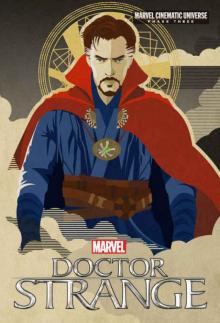 Phase Three: MARVEL's Doctor Strange
Phase Three: MARVEL's Doctor Strange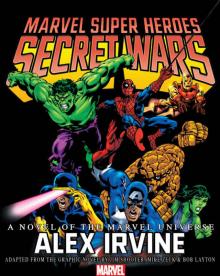 MARVEL SUPER HEROES SECRET WARS
MARVEL SUPER HEROES SECRET WARS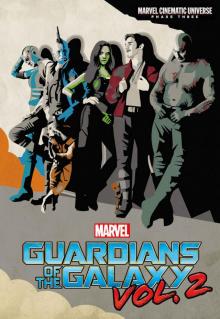 Phase Three: MARVEL's Guardians of the Galaxy Vol. 2
Phase Three: MARVEL's Guardians of the Galaxy Vol. 2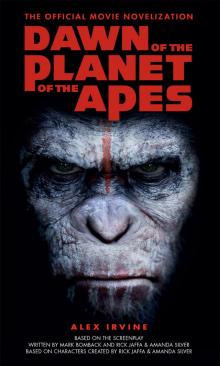 Dawn of the Planet of the Apes
Dawn of the Planet of the Apes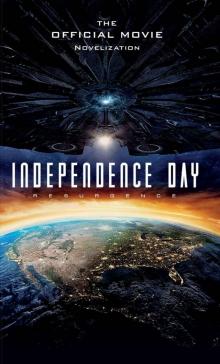 Independence Day: Resurgence: The Official Movie Novelization
Independence Day: Resurgence: The Official Movie Novelization